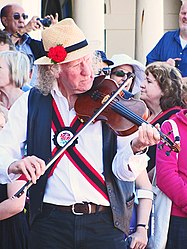Fiddles

A fiddle being played.
|
|
| String instrument | |
|---|---|
| Hornbostel–Sachs classification | 321.322-71 (Composite chordophone sounded by a bow) |
| Developed | Early 16th century |
| Playing range | |
| Related instruments | |
|
|
| Musicians | |
| Builders | |
Fiddle is another name for the bowed string musical instrument more often called a violin. It is also a colloquial term for the instrument used by players in all genres, including classical music. Fiddle playing, or fiddling, refers to various styles of music. Fiddle is also a common term among musicians who play folk music on the violin. The fiddle is part of many traditional (folk) styles of music which are aural traditions, taught 'by ear' rather than via written music.
There are few real distinctions between violins and fiddles, though more primitively constructed and smaller violins are more likely to be considered fiddles. Due to the style of the music played, fiddles may optionally be set up with a bridge with a flatter arch to allow multiple strings to be played simultaneously with more ease, such as the droning in bluegrass music or performing triple stops.
In order to produce a "brighter" tone, compared to the deeper tones of gut or synthetic core strings, fiddlers often prefer to use steel strings on their instruments. Among musical styles, fiddling tends to produce rhythms focused on dancing, with associated quick note changes, whereas classical music tends to contain more vibrato and sustained notes. It is less common for a classically trained violinist to play folk music, but today, many fiddlers have classical training.
The medieval fiddle emerged in 10th-century Europe, deriving from the Byzantine lira (Greek: λύρα, Latin: lira, English: lyre), a bowed string instrument of the Byzantine Empire and ancestor of most European bowed instruments. The first recorded reference to the bowed lira was in the 9th century by the Persian geographer Ibn Khurradadhbih (d. 911); in his lexicographical discussion of instruments he cited the lira (lūrā) as a typical instrument of the Byzantines and equivalent to the rabāb played in the Islamic Empires. Lira spread widely westward to Europe; in the 11th and 12th centuries European writers use the terms fiddle and lira interchangeably when referring to bowed instruments (Encyclopædia Britannica. 2009).
...
Wikipedia

